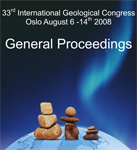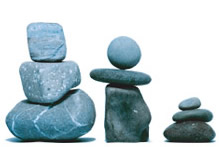
33IGC General Proceedings – now available for download

The General Proceedings of the 33rd IGC is now available as a PDF download, both in high and low resolution. In order to reduce cost and use of paper, a print version will not be distributed to Congress participants in general. However, the Organising Committee hopes that this electronic version will be read by many. We apologize for the delayed publication of this report.
Comprehensive field guides online
A number of comprehensive field guides are available on the 33 IGC website. The field guides offer in-depth information on many of the IGC excursions.
Lectures available as webcasts
Many lectures from the 33 IGC are available as webcasts on the website, and are grouped by days in the menu. The webcasts include both footage of the lecturer and presentation slides.

Geoscience World Congress 2008
“Earth System Science: Foundation for Sustainable Development”
In collaboration with the International Union of Geological Sciences (IUGS) and many other international and national organisations, the National IUGS Committees in the five Nordic Countries (Norden): Norway, Denmark, Finland, Iceland and Sweden, hosted the 2008 Congress.
Assignment Integration: Linking 33IGC Insights with College Projects
Leveraging platforms to write your assignments online offers students a seamless way to incorporate the latest findings from the 33IGC into their academic work. The request to do my assignment for me has evolved, with students seeking cheap yet credible sources to enrich their college studies. This approach not only makes it easier to write my assignment but also ensures that the educational journey is both current and comprehensive, bridging theoretical knowledge with real-world geological insights.
By partnering with the best assignment writing services, students gain the opportunity to enhance their learning experience with the latest scientific insights, making their educational journey both enriching and relevant.
Academic Growth Through Global Geological Insights
College students today stand at the crossroads of academic pursuit and global scientific discovery, particularly within the realms explored by the International Geological Congress.
Key Topics at the Forefront of Geological Research
The International Geological Congress offers a wide array of topics that are pivotal for both the geological community and academic research. These topics not only cater to the diverse interests of geoscience students but also provide a robust framework for their projects and research endeavors. Here is a list of key topics covered by the congress:
- Climate Change: Exploration of the geological aspects of climate variability, past climate changes, and future predictions.
- Sustainable Resource Management: Strategies and practices for the sustainable extraction and management of mineral and water resources.
- Technological Advancements in Geology: The latest innovations in geological surveying, data analysis, and modeling techniques.
- Environmental Geoscience: Studies on soil degradation, pollution, and the restoration of ecosystems affected by geological processes.
- Natural Hazards: Research on earthquakes, volcanic eruptions, landslides, and their impact on human societies.
- Petrology and Geochemistry: The composition, structure, and processes affecting the Earth’s crust and mantle.
- Geological Heritage and Geoconservation: Efforts to preserve significant geological sites and promote awareness of the Earth’s geological history.
- Planetary Geology: Comparative studies of geological processes on Earth and other celestial bodies.
- Hydrogeology: The study of groundwater, its movements, and its role in sustaining ecosystems and human communities.
These topics not only provide a foundation for academic inquiry but also encourage students to engage with current issues and challenges in the field of geology, fostering a deeper understanding and appreciation of the Earth’s processes and resources.
Enhancing Research and Innovation
The International Geological Congress covers a plethora of subjects that can significantly enhance the academic and research capabilities of college students.
By tapping into the latest findings and methodologies presented at the congress, students can elevate their research papers, thesis projects, and presentations, ensuring their work resonates with current global challenges and solutions.
Cultivating a Global Perspective
Participation in or study of the International Geological Congress’s proceedings encourages college students to adopt a global perspective in their academic endeavors.
By integrating the congress’s insights into their projects, students are not just completing assignments; they are preparing themselves for a career that demands a broad, interconnected view of the planet’s geological fabric.
